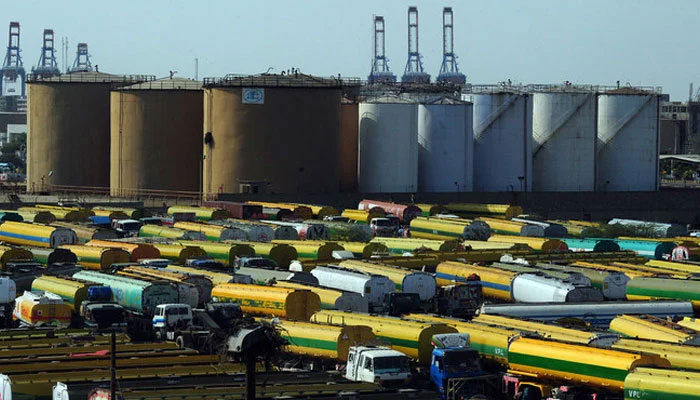Cnergyico gets approval to export 40,000 tonnes furnace oil
KARACHI: The Oil and Gas Regulatory Authority (Ogra) has granted Cnergyico Pakistan Limited (CPL) permission to export 40,000 metric tonnes (MT) of high-sulphur furnace oil (HSFO) this month, citing excess stock and reduced local demand.
In a letter to CPL, Ogra allowed the refinery to export 20,000MT of HSFO from Kemari port in the coming days, with an additional consignment of 20,000MT scheduled for the fourth week of December 2024.
The decision comes as domestic demand for furnace oil has dwindled significantly, with power plants deprioritising its use for electricity generation due to high costs.
According to data obtained by The News, the country has 453,000MT of furnace oil stocks. Refineries have 225,000MTs of furnace oil stocks, and the rest is with oil marketing companies (OMCs) and power plants.
Among refineries, Pak Arab Refinery Limited (Parco) leads with 32,300 MT, followed by CPL with 24,200 MT. National Refinery Limited has 5,500 MT, while Pakistan Refinery Limited and Attock Refinery Limited hold 2,900MT and 1,400MT, respectively.
Pakistan has turned to exporting furnace oil due to its diminished role in domestic power generation. A record 430,000MT was exported in the first four months of the current fiscal year, with monthly exports comprising 116,000MT in July, 66,500MT in August, 114,000MT in September, and 133,700MT in October.
Electricity generation from furnace oil plummeted by 87 per cent during this period compared to the same timeframe last year. In October, its use in power generation was nearly negligible, reflecting the government’s policy shift toward cost-effective alternatives.
Under the new refining policy, local refineries are set to significantly reduce furnace oil production. The policy aims to cut high-sulphur furnace oil output by 78 per cent, reducing daily production from 15,500MT to 3,400MT after refinery upgrades. However, these upgrades have faced delays due to disagreements over sales tax exemptions on petroleum products in the current fiscal year. As Pakistan’s energy sector evolves, the focus remains on transitioning to more efficient and sustainable practices, with reduced reliance on high-sulphur furnace oil.
-
 'Too Hard To Be Without’: Woman Testifies Against Instagram And YouTube
'Too Hard To Be Without’: Woman Testifies Against Instagram And YouTube -
 Kendall Jenner Recalls Being ‘too Stressed’: 'I Want To Focus On Myself'
Kendall Jenner Recalls Being ‘too Stressed’: 'I Want To Focus On Myself' -
 Dolly Parton Achieves Major Milestone For Children's Health Advocacy
Dolly Parton Achieves Major Milestone For Children's Health Advocacy -
 Oilers Vs Kings: Darcy Kuemper Pulled After Allowing Four Goals In Second Period
Oilers Vs Kings: Darcy Kuemper Pulled After Allowing Four Goals In Second Period -
 Calgary Weather Warning As 30cm Snow And 130 Km/h Winds Expected
Calgary Weather Warning As 30cm Snow And 130 Km/h Winds Expected -
 Maura Higgins Reveals Why She Wears Wigs On 'The Traitors' And What Her Real Hair Is Like
Maura Higgins Reveals Why She Wears Wigs On 'The Traitors' And What Her Real Hair Is Like -
 Brandi Glanville Reveals Shocking Link Of Facial Issues To Leaking Implants, Claims 'no' Support From Ex Eddie Cibrian
Brandi Glanville Reveals Shocking Link Of Facial Issues To Leaking Implants, Claims 'no' Support From Ex Eddie Cibrian -
 Who Is Rob Rausch’s Girlfriend? 'The Traitors' Winner Linked To Kansas City Woman
Who Is Rob Rausch’s Girlfriend? 'The Traitors' Winner Linked To Kansas City Woman -
 Bobby J. Brown, 'Law & Order' And 'The Wire' Actor, Dies At 62
Bobby J. Brown, 'Law & Order' And 'The Wire' Actor, Dies At 62 -
 Netflix Gives In As Paramount Offers Massive Breakup Fee To Step Away From Warner Bros. Discovery Bid
Netflix Gives In As Paramount Offers Massive Breakup Fee To Step Away From Warner Bros. Discovery Bid -
 Who Won 'Traitors' Season 4? Rob Rausch Claims $220,800 Grand Prize
Who Won 'Traitors' Season 4? Rob Rausch Claims $220,800 Grand Prize -
 Niall Horan Shares Update On New Music On The Way
Niall Horan Shares Update On New Music On The Way -
 Backstreet Boys Member Brian Littrell Refiles Trespassing Lawsuit Against Florida Retiree
Backstreet Boys Member Brian Littrell Refiles Trespassing Lawsuit Against Florida Retiree -
 Kate Middleton Dubbed ‘conscious Shopper’ By Famous Fashion Expert
Kate Middleton Dubbed ‘conscious Shopper’ By Famous Fashion Expert -
 Princess Catherine Joins Volunteers In Newtown During Powys Visit
Princess Catherine Joins Volunteers In Newtown During Powys Visit -
 Shamed Andrew Thought BBC Interview Was ‘time To Shine,’ Says Staff
Shamed Andrew Thought BBC Interview Was ‘time To Shine,’ Says Staff




